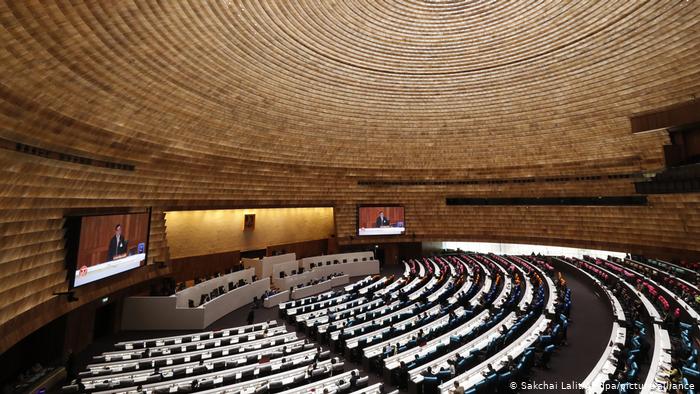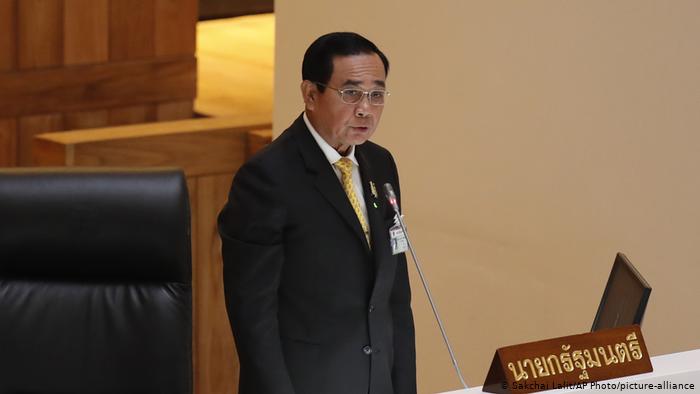
Audio By Carbonatix
Prime Minister Prayuth Chan-ocha has opened a parliamentary session to deal with on-going mass protests in the country. Germany has warned the Thai king over his activities.
Members of Thailand's Parliament met on Monday for a special session to address the pro-democracy protests which have drawn thousands onto the streets on an almost daily basis.
The student-led demonstrations have called for the removal of Prime Minister Prayuth Chan-ocha as well as constitutional reforms and limits to the power of the monarchy.
Organizers also planned a demonstration march to the German embassy with a petition for Berlin to investigate King Maha Vajiralongkorn's use of his powers while in the European country, where he spends much of his time.
German Foreign Minister Heiko Maas said on Monday that he was looking into the Thai king's behavior.
"We are monitoring this long-term," Maas said. "It will have immediate consequences if there are things that we assess to be illegal."
What happened in the parliamentary session?
Only 450 of the 731 members of Parliament showed up for the meeting as the speaker of the house, Chuan Leekpai, commenced the two-day session.
Prayuth called for the session after imposing emergency measures which banned protests. He rejected the demands made by the tens of thousands of protesters to step down.

"I’m confident that today, regardless of our different political views, everyone still loves the country," Prayuth said in his opening address.
Prayuth's government set the agenda for the debate, including issues regarding risks of coronavirus outbreaks at protests, alleged interference with a royal procession by a small group earlier in the month and the destruction of royal images. None of the protesters' demands were set to be discussed.
"The Prime Minister is a major obstacle and burden to the country. Please resign and everything will end well," said Sompong Amornvivat, leader of the opposition Pheu Thai, the biggest single party in Parliament.
The opponents of the prime minister also told him to stop using the monarchy to justify maintaining his grip on power after he used an incident at a royal motorcade to impose nationwide emergency powers.
What is Prayuth's role in the crisis?
The Prime Minister asked the house to "creatively find a balance" to resolve the tension, but opposition parties and protest leaders were skeptical about the parliament's ability to solve the crisis. The prime minister's supporters have a majority in the parliament and the upper house was entirely nominated by his military junta.
Prayuth seized power in 2014 in a coup. Protesters accused him of manipulating the previous election in order to hold on to power. They also held the monarchy responsible for enabling decades of military domination.
Latest Stories
-
Ghana is rising again – Mahama declares
4 hours -
Firefighters subdue blaze at Accra’s Tudu, officials warn of busy fire season ahead
5 hours -
New Year’s Luv FM Family Party in the park ends in grand style at Rattray park
5 hours -
Mahama targets digital schools, universal healthcare, and food self-sufficiency in 2026
5 hours -
Ghana’s global image boosted by our world-acclaimed reset agenda – Mahama
5 hours -
Full text: Mahama’s New Year message to the nation
5 hours -
The foundation is laid; now we accelerate and expand in 2026 – Mahama
6 hours -
There is no NPP, CPP nor NDC Ghana, only one Ghana – Mahama
6 hours -
Eduwatch praises education financing gains but warns delays, teacher gaps could derail reforms
6 hours -
Kusaal Wikimedians take local language online in 14-day digital campaign
7 hours -
Stop interfering in each other’s roles – Bole-Bamboi MP appeals to traditional rulers for peace
7 hours -
Playback: President Mahama addresses the nation in New Year message
8 hours -
Industrial and Commercial Workers’ Union call for strong work ethics, economic participation in 2026 new year message
9 hours -
Crossover Joy: Churches in Ghana welcome 2026 with fire and faith
10 hours -
Traffic chaos on Accra–Kumasi Highway leaves hundreds stranded as diversions gridlock
10 hours

